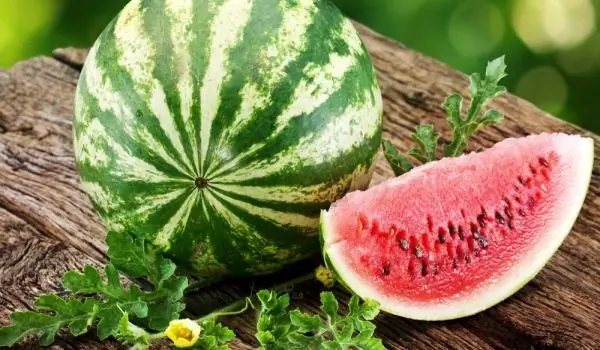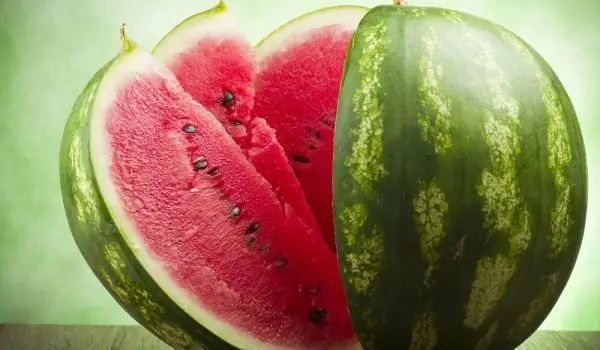2025 Author: Jasmine Walkman | [email protected]. Last modified: 2025-01-23 10:18
The first for the season watermelon the native markets were already flooded and people rushed to buy the juicy fruit. But leading Bulgarian agronomists recommend that you refrain from buying them.
It turns out that the fruits are of extremely low quality, in addition they are full of pesticides and nitrates, leading Bulgarian agronomists warn.
Only half an hour after cutting the watermelon, it softens and turns into a shapeless mush. The larger pieces stick together and look like a foam sponge, the sufferers complain.
According to domestic producers, this is due to the fact that the watermelons on the market are mainly imported from Turkey, where the use of plant protection products and fertilizers is not controlled as in the European Union.

Some producers assume that part of the production may be Bulgarian, but heavily inflated with all kinds of chemicals, so that it can gain weight quickly and ripen early.
The juicy fruit flooded the domestic market at the beginning of last week, as the first watermelons were offered at a price of about 70 stotinki per kilogram.
But pressed by the huge amount of cheap imports, traders were forced to halve their price and currently a kilo of watermelon is offered about 35 cents on the stock exchange.

Agronomists warn that the earliest Bulgarian watermelons will appear on the market only in late July, early August. Until then, all that is offered is either imports from warmer countries or watermelons filled with a solid amount of chemicals.
According to people familiar with the matter, larger watermelons are more dangerous because their size is a sure sign that they have received too much nitrogen fertilizer.
Experts also advise not to buy watermelons offered along busy roads, because even after cutting the fruit continues to breathe with its skin and absorbs any toxins from the air.
If you still can't wait for the native watermelons to ripen, stop at a medium-sized fruit. When slicing, leave at least 1 cm of red core on the bark, as it is in the bark that the most harmful nitrates are concentrated.
Recommended:
Emphasize Watermelons And Melons This Summer

In the summer on the Bulgarian market there is an extremely large selection of fruits - the most preferred during the season are watermelons and melons. Slightly chilled, these fruits are a great way to save yourself at least a little from the summer heat.
Greek Watermelons Flood The Home Markets

It is almost impossible to buy Bulgarian watermelons from the markets in our country, as most of the summer fruits are imported from Greece. Bulgarian producers blame the rain for the lack of Bulgarian watermelons. Apart from the fact that the production is extremely low this year, the native farmers also face great difficulties with the competition from the Greek side, because the fruits from our southern neighbor are offered at lower prices than the domestic production.
The First Bulgarian Watermelons Are Already On The Market. Don't Buy Them

The first production of Bulgarian watermelons is already available in our country, but according to the producers they are not bought, as they are offered at slightly higher prices than the imported ones. The trade network is already flooded with Greek and Macedonian watermelons, which have seriously reduced the value of summer fruits, so that Bulgarian farmers are unable to market their production, bTV reports.
We Ate Cheaper Watermelons And More Expensive Lemons

In August, the cheapest goods in Bulgaria were watermelons and melons, according to a study by the National Statistical Institute. At the same time, lemons have reached record high prices. The NSI report shows that compared to July 2014, the price of watermelons and melons fell by 16.
Serious Decline In Prices Of Watermelons And Apricots For The Week

The State Commission on Commodity Exchanges and Markets reported a decrease in the prices of most food products for the last week, but the most visible is the decline in watermelons and apricots. For a week the price of watermelons has fallen by 25%.

